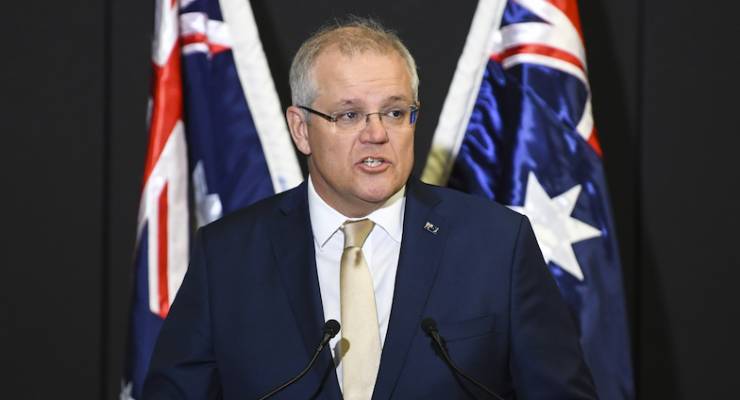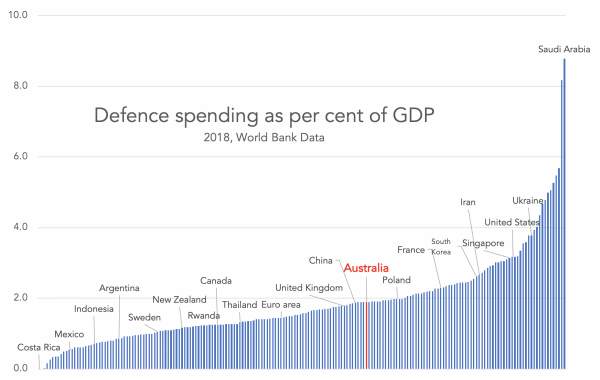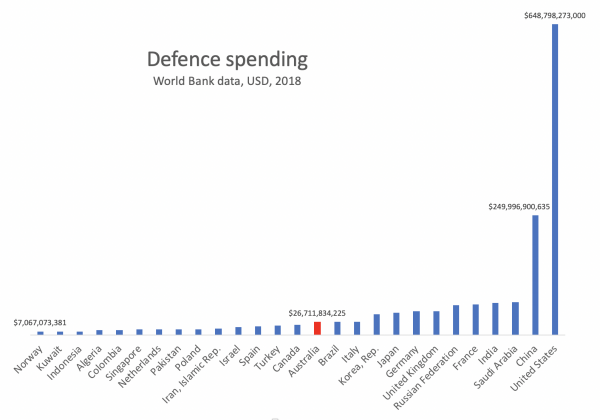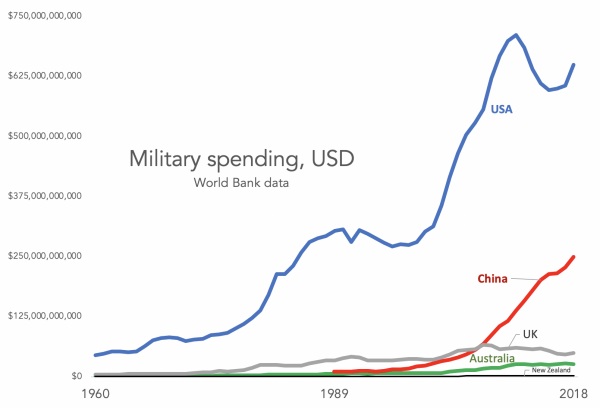
Australia has a bipartisan commitment to spend 2% of its GDP on defence. But how was that decided?
As this chart shows, by spending just under 2% on defence we are above the global median as far as share of the economy goes — but still mid-pack.

Australia has fallen short of the 2% target for several years, but this year, with GDP in retreat thanks to the coronavirus recession, we might finally achieve it.
The fact a recession can help us meet our defence targets shows just how silly it is to set defence spending as a share of GDP. It should be set by reference to strategic ambitions.
As this next chart shows, looking at spending as a per cent of GDP is misleading. Not only does it fail to acknowledge that Australia has the 13th highest military spending in the world, it means you fail to notice the elephants in the room.

The graphic shows the sheer size of the US military. The US spends more than twice what China does. (Although due to lower prices for wages and equipment in China, the ratio is probably not quite as substantial as it seems.)
Those two elephants — the US and China — are engaged in a great strategic battle for influence. We can’t ignore it. We must determine if we can affect it.
Either we face a real threat or we don’t. If we do, spending a fixed per cent of GDP is not a smart way to combat it. If we don’t, spending a fixed per cent of GDP is a waste.
And, possibly even worse, it can make us a target. But figuring out what is optimal is not simple.
The China question
I’d argue China did not pose a real threat as recently as a few years ago: under Hu Jintao it was publicly committed to a peaceful rise and, anyway, it was militarily weak.
That has changed fast. China has sharply ramped up its military spending, as this chart shows.

China under Xi Jinping is a different story. It’s richer and far bolder in its political rhetoric (antagonised, no question, by US President Donald Trump). It is also more aggressive and territorially ambitious. Hong Kong has been conquered. Is Taiwan next?
Xi changed the protocols around term limits. His Putin-style eternal rule removes an important check on his power and raises the risk that one man’s whims can create a war.
So China is aggressive and expansionist. Must that affect us?
Well, does it have ambitions beyond Taiwan? Perhaps a few border tweaks in South-East Asia and India. Perhaps a few islands. China is committed to a maximalist concept of what counts as its territory but the idea it will head off on a Napoleonic conquest beyond that is far-fetched.
The arguments in favour of China attacking Vietnam are dumb, and an invasion of Australia is certainly not a strategic ambition.
So our military investments are about reducing China’s influence and freedom to act against our interests, rather than our territory. We need to think carefully about our interests and the costs of defending or not defending them.
The paradox
Powerful enemies get the most attention. Australia has bought long-range ship-killing missiles that reduce the ability of the Chinese navy to operate with impunity in south-east Asia.
Why did Japan bomb Pearl Harbour? Because the US was strong, not because it was weak. Our increasing military strength makes Australia more pertinent to Chinese military planners.
While China doesn’t want to occupy Australia, it could attack our military targets if it felt they were blocking its goals. A military strike is not out of the question if we oppose Chinese interests in some third place.
What’s more, the stronger our military, the more likely we are to choose to oppose China. Politicians are easily emboldened. If we have the tools to defend Taiwan from Chinese attack we’re more likely to use them. In this way, beefing up our military could make us more likely to end up in armed conflict.
So should we shrink back, wash our hands of great powers’ conflict and let them run amok in their sphere of influence? New Zealand has done so and seems secure in its choices.
One reason to try to crimp China’s more aggressive ambitions before they manifest is it needn’t be an eternal struggle.
Countries can change, especially when they change leaders. Not everywhere is North Korea, where the leadership is dynastic and the philosophy just as rigid. The lesson of Deng Xiaoping and Gorbachev? Countries can turn moderate.
It’s also possible the world will get wise and revitalise international institutions it set up after the last big war, using multilateral methods to try to lock in peace. That’s an area where Australia’s interests are clear, and we could afford to commit a lot more money and effort.








On what basis is it stated that “While China doesn’t want to occupy Australia”? The CCP using Chinese workers could presumably access this country’s mineral and agricultural resources far more intensively and economically under occupation. This has been the basis for the expansion of empires throughout history, with Australia at serious risk of being occupied by an Asian power as recently as the 1940’s.
Japan had no such plan although we thought they did. The wanted to cut us off from the US as a build up. The Yamamoto and the like scotched it as too ambitious and too long of a supply line. China has no real history of occupations, rather the reverse. It does have history of demanding tribute though and that is where we perhaps should focus.
occupy us and extract our mineral wealth.. you mean the British.. surely..
This ridiculous “Punching Above Our Weight” rhetoric is another remnant of Howard’s legacy. We are of no importance in the world of realpolitic-just a middling nation of no real influence, so taking a similar policy step as New Zealand makes sense.
Attaching ourselves to America and being involved in wars-Vietnam, Syria, Afganistan, etc that are not in our interests is incompetent politics.
We would have far more respect and influence in the South Pacific region if we were non-aligned and focussed on our neighbours-cutting aid and trashing foreign services is producing the exact opposite.
You are correct redgum, we would be a lot safer and and wealthier if we dumped our 5 eyes folly, and sourced some very basic deterrent weapons from European suppliers rather than the US.
We should leave the US to wallow in its own warmongering juices until they come to their senses and behave decently internationally.
Completely agree that we need to be clear eyed on PRC’s ambitions for power and territory in our region. Their recent aggression should have us worried. Also agree that the bigger our defence capability, the bigger potential target we become. Therein lies the catch 22.
If or when PRC decides to invade Taiwan, China will not take this huge risk and just hope nobody else comes to their aid. A Taiwan invasion will almost certainly involve strikes on military bases in Japan, Guam, Australia and other USA aligned military assets. Think Darwin, Pine Gap, Katherine etc. China will need all risks of failure in Taiwan dealt with. And that means taking out anybody who might come to Taiwan’s aid. So there is no way we can expect to be an unaffected bystander. We will be in this whether we like it or not, regardless of this “big spend”.
There is also the matter of “what we stand for”. Do we just let a strong, vibrant, peaceful democracy be annihilated to satisfy a power hungry dictator. There but for the grace of god…
By building up, we increase the risk and cost of Xi’s thirst to redress centuries old feuds. Hopefully, as you say, long enough for a more peaceful regime to come into play in China.
“Hong Kong has been conquered. Is Taiwan next?”
Hong Kong was was not “conquered”, it was handed back to the Chinese at the end of a 99 year lease to the British.
Taiwan is not recognised as a sovereign state by the Australian Government and is considered (by both Australia and the Chinese) to be a province of China.
Letter to the Editor – CRIKEY
Dear EIC,
Re: The Catch Cry – “CALL OUT THE ARMY”
In recent times whenever there is a situation, event, disaster or crisis needing MANPOWER, the Politician’s give the masses confidence by saying we will “call out the ARMY”.
So, one (the Public for sure do) would think that’s a good idea, let’s get the ARMY boys in to help Fight Bushfires, help save people in Floods, cyclones and other natural disasters, man State Borders and Guard Hotels in a Pandemic.
If we had a great big ARMY, well that could and should be a way out of these situations. However the facts are Australia has a very little ARMY, which is as per the Defence Departments latest document Australian Government / Department of Defence / 2020 Force Structure Plan Defence Workforce Factsheet — PDF (3.26 MB) states:
Growth of around 50 permanent Army people to FY2023-24 the current Army workforce at 1 June 2020 is 29,730
Now here is the thing, that 29,730 is the WHOLE Australian Army. Western Australia has the second least ARMY, with Tasmania getting the wooden spoon.
So let’s see if WA portion of the ARMY can deal with and look after WA in disaster situations as before mentioned.
For a start WA has NO PERMANENT ARMY UNITS , except the SAS which is special forces, a group well above just being a foot soldier and therefore never available, nor should they be, for such rolls.
Including the SAS numbers the total ARMY personnel in WA is currently around 825, some 700 plus are SAS soldiers, therefore there is say 125 Regular Permanent soldiers in WA.(NB: 825 is 2.8% or 125 is 0.42% of the total Australian ARMY)
Bear in mind this group of 125 soldiers sole roll in WA is to Administrate and Commander the Reserve Units of 13 Brigade.
These are Officers and Senior NCO;s that are past being foot soldiers and working soldiers.
Therefore what happens when WA needs the help of ARMY, is that they are flown in from the EASTERN STATES.
This has just occurred again this past week to man Border Check Points and be Security Guards at Quarantine Hotels, and apparently a few more are on their way over.
It is very plain to see that if we need really significant Army Manpower to help with floods, cyclones and especially Bushfires we are primarily on our own. Oh, and let us not even think about Security and Defence of our huge state which is only 2.827 million KM 2 = to (34.4 %) of the whole of Australia.
The heading is CALL OUT THE ARMY, so how about it, can we do that, because it seems to me that after decades of Departmental and Government rhetoric, the ADF’s abilities in WA especially the ARMY has not change since the end of WW2.
If has in fact diminished, as in 1992 the last Permanent Army unit in WA, 22 Construction Squadron RAE, was disbanded.
Thank you for your time and regards,
Peter Billington
Greenwood
Perth WA
the SAS dont do much on home soil.. unless you want to include things like the Swanbourne.. I mean Claremont killings..